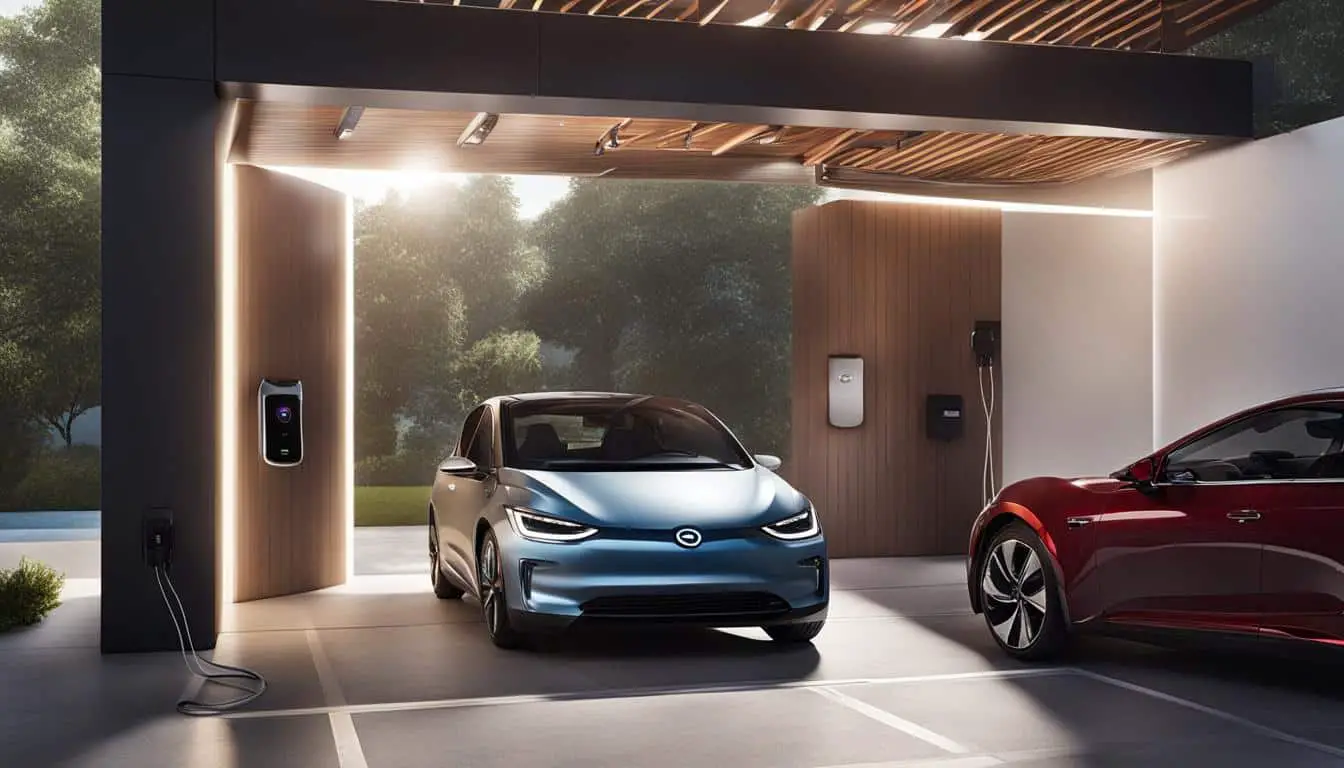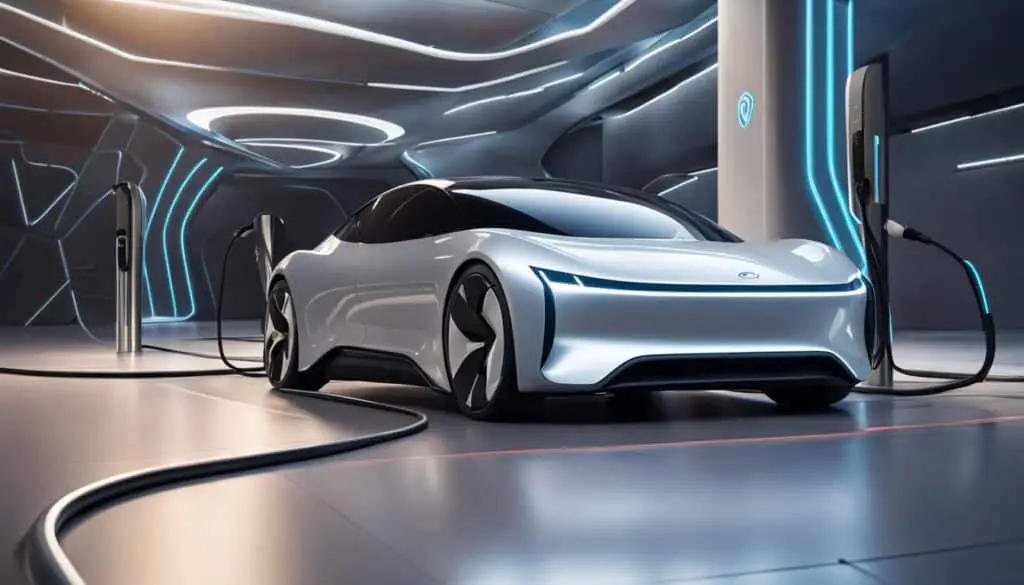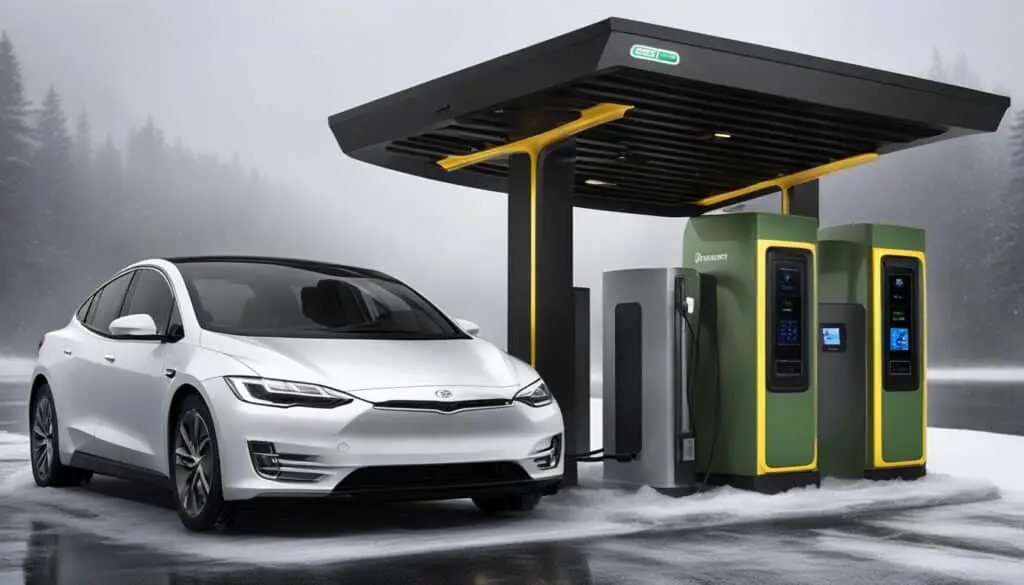
How to Choose the Best Home Charging Station for Your Electric Vehicle
When it comes to choosing the best home charging station for your electric vehicle (EV), there are several factors to consider. While recharging an EV takes longer than refueling a gasoline-powered car, the convenience of charging at home cannot be beaten. According to the JD Power U.S. Electric Vehicle Experience (EVX) Home Charging Study, 83% of all EV charging is done at home. In this section, I will explore the key aspects of choosing the right charging equipment, installing it properly, and the best practices for using EV charging equipment at home.
Key Takeaways:
- Choosing the right home charging station is crucial for electric vehicle owners.
- Consider factors such as cost, installation, charging speed, and features when making a decision.
- Most EV charging is done at home, making it convenient and accessible.
- Understanding EV charging equipment terminology is essential.
- Power source, on-board charger capacity, and environmental factors affect charging speed and capacity.
Understanding EV Charging Equipment
When it comes to EV charging, it’s important to familiarize yourself with the terminology and equipment involved. While many people use the term “charger” to refer to the device they plug into their electric vehicle, technically, the charger is built into the car itself. The external device is actually referred to as Electric Vehicle Supply Equipment (EVSE). The EVSE supplies the necessary voltage to the vehicle, while the internal charger within the car is responsible for physically charging the battery.
Throughout this article, we will use the term “charger” to refer to the EVSE, as it is a commonly used term that encompasses both the EVSE and the in-car charger. Please keep in mind that the charging capabilities may vary depending on the manufacturer and model of your EV.
It’s worth noting that most EVs come with a portable charging cable that can be connected to standard household outlets. However, the charging speed may be slower compared to using a dedicated charging station. Dedicated charging stations, also known as level 2 chargers, typically require a 240-volt outlet and offer faster charging times.
To help visualize the difference between a charger and an EVSE, refer to the image below:
Factors to Consider When Choosing a Home Charging Station
When selecting a home charging station for your electric vehicle (EV), there are several factors to consider:
- Cost: The cost of home charging stations can range from $200 to over $1,000. It’s important to determine your budget and find a charging station that fits within your price range.
- Plug-in vs. Hardwired: You have the option to choose between a plug-in or hardwired charging unit. A plug-in charger offers flexibility and mobility, allowing you to easily move it if needed. On the other hand, a hardwired charging station provides a more permanent and professional installation.
- Cable Length: Consider the length of the charging cable to ensure it can comfortably reach your car’s charging port in any parking position.
- Smart vs. Dumb Charger: Smart chargers offer additional features such as smartphone control and data monitoring, providing more convenience and control. Dumb chargers, on the other hand, simply charge the EV without any additional capabilities.
- Power Delivery Capacity: It’s recommended to choose a charging station with a power delivery capacity of at least 32-amps to charge your EV efficiently.
- Safety Certification and Warranty: Look for charging stations that have safety certifications to ensure their reliability and adherence to industry standards. Additionally, consider the warranty offered by the manufacturer to protect your investment.
By taking these factors into account, you can make an informed decision and choose a home charging station that meets your needs and preferences.
Charging Speed and Capacity
When it comes to charging your electric vehicle (EV) at home, the charging speed and capacity are important factors to consider. The charging speed determines how quickly your EV’s battery can be replenished, while the capacity refers to the amount of power that can be delivered to your vehicle.
The charging speed of your EV depends on various factors, including the power source and the on-board charger capacity. The power source can be a regular 120-volt household plug or a level 2 charging station with a 240-volt outlet. Generally, using a level 2 charging station with a higher voltage can significantly reduce the charging time compared to a standard household plug.
The on-board charger capacity of your EV also plays a crucial role in charging speed. Different EV models have different on-board charger capacities, which determine how quickly the battery can be charged. EVs with higher charger capacities can charge at a faster rate, reducing the overall home charging time.
Environmental factors can also impact the charging speed of your EV. Extremely low or high temperatures can affect the efficiency of the charging process and potentially slow down the charging speed. It’s important to account for these environmental factors when estimating the time needed to fully charge your EV.
It’s worth noting that most level 2 charging stations can fully charge an EV battery overnight, making them a convenient option for home charging. However, it’s essential to consider the power source, on-board charger capacity, and environmental factors to accurately assess the charging time for your specific EV model.

Installation and Location
When it comes to installing your home charging station, there are a few key considerations to keep in mind. Firstly, it’s important to select a weather-proof charging station, especially if you live in an area with extreme weather conditions. This will ensure that your charging equipment remains safe and functional in any situation.
The cable length of your charging station is another factor to consider. You’ll want to make sure that the cable is long enough to reach your car’s charging port from the desired installation location. This will give you flexibility in parking and charging your electric vehicle without any inconvenience.
Additionally, some charging stations offer helpful features such as cable management and locking mechanisms. Cable management systems can help keep your charging area organized and free from trip hazards, while locking mechanisms provide added security for your charging equipment.
Lastly, the size and appearance of the charging station should not be overlooked. It’s important to choose a charging station that fits well in the designated installation space and blends harmoniously with its surroundings. A sleek and modern design can add to the overall aesthetic appeal of your home while providing a functional charging solution.
Here’s an image of a weather-proof charging station that offers cable management and a sleek design:

Conclusion
Choosing the best home charging station for your electric vehicle is a personal decision based on your specific needs and preferences. By considering factors such as cost, installation, charging speed, and features like smart capabilities, you can find the perfect charging station for your EV.
When it comes to cost, home charging stations can range from $200 to over $1,000. It’s important to weigh the price against the features and functionality that you value the most. Additionally, considering the installation process is crucial. Ensure that the charging station is compatible with your electrical system and that you have the necessary space for installation.
Charging speed is another important consideration. Depending on your power source, on-board charger capacity, and battery size, charging times can vary. Keep in mind that most level 2 charging stations can charge a full EV battery overnight, providing sufficient power for your daily commute.
Lastly, exploring charging stations with smart capabilities can offer added convenience and control. From smartphone integration to energy monitoring, these features can enhance your charging experience. By finding the best home charging station for your EV and taking advantage of available tax credits and rebates, you can power your electric car efficiently and conveniently.
FAQ
What factors should I consider when choosing a home charging station for my electric vehicle?
When choosing a home charging station, you should consider factors such as cost, plug-in or hardwired unit, cable length, smart or “dumb” charger, power delivery capacity, safety certification, and warranty.
How much do home charging stations cost?
The cost of home charging stations can range from $200 to over $1,000.
Should I choose a plug-in or hardwired charging station?
The type of charging station (plug-in or hardwired) depends on your preference and flexibility.
How long should the cable length be for my charging station?
The cable length should be long enough to reach your car’s charging port in any parking position.
What is the difference between a smart charger and a “dumb” charger?
Smart chargers offer additional features such as smartphone control and data monitoring, while “dumb” chargers only charge the electric vehicle.
What power delivery capacity should I look for in a home charging station?
The power delivery capacity of a home charging station should be at least 32-amps.
What safety certifications should a home charging station have?
It is recommended to choose a home charging station with safety certification and a 3-year warranty.
How fast can I charge my electric vehicle at home?
The charging speed at home depends on factors such as the power source (regular 120-volt household plug or a level 2 charging station), on-board charger capacity, battery size, and environmental factors. Most level 2 charging stations can charge a full EV battery overnight.
What should I consider when installing a home charging station?
When installing a home charging station, you should consider factors such as weather-proofing, cable length, cable management, locking mechanisms, and the size and appearance of the charging station.
How do I choose the best home charging station for my electric vehicle?
Choosing the best home charging station for your electric vehicle is a personal decision based on your specific needs and preferences. Consider factors such as cost, installation, charging speed, and features like smart capabilities. Also, check for any available tax credits or rebates to offset the cost of installation.
